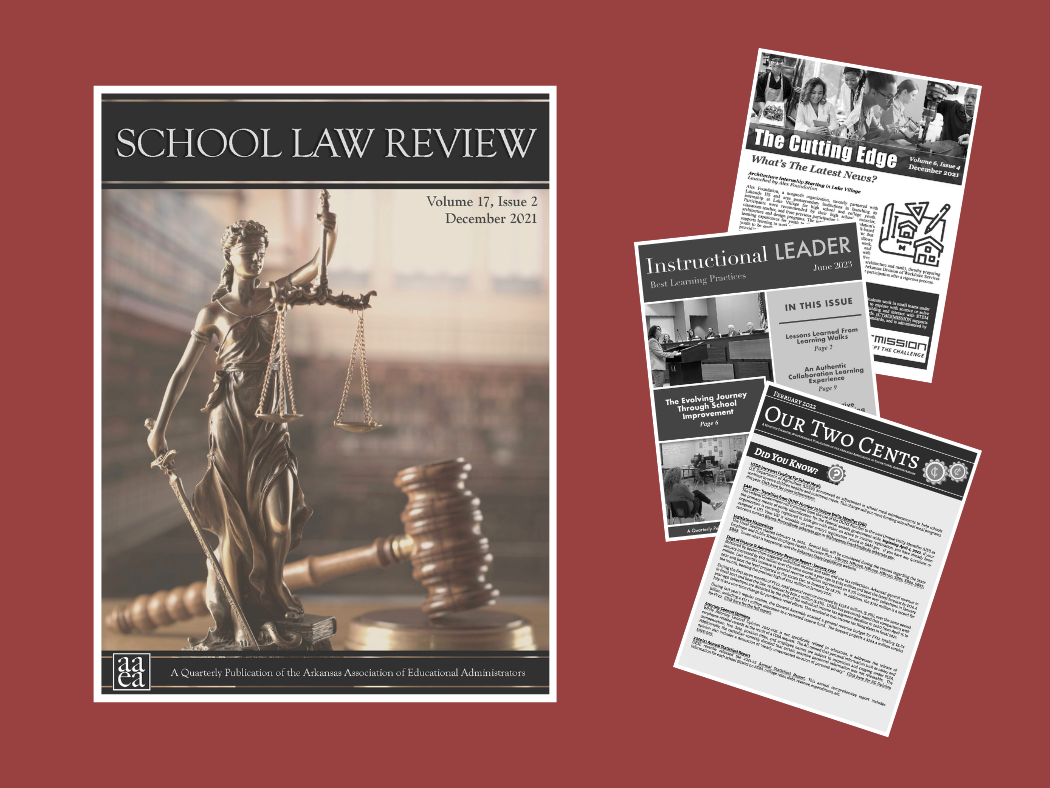
1 minute read
Publication Sneak Peek
School Law Review
This segment features content from other AAEA publications. School Law Review is a quarterly publication available to subscribing districts. The following excerpt comes from the June 2023 issue.
RECENT COURT DECISIONS: FIRST & FOURTH AMENDMENTS

Mama Bears v. Forsyth Cnty. Schs., U.S. District Court for the Southern District of Georgia (Feb. 21, 2023)
A conservative parent group sued the district alleging that its members' rights under the 1st Amendment had been violated when a member of the group was banned from attending the district’s board meetings after she insisted on reading sexually explicit material contained in books from the district’s school libraries aloud at a prior meeting. After the meeting, the board implemented a policy that required speakers to conduct themselves in a “respectful manner” and prohibited speakers from addressing board members individually or acting in a loud or boisterous manner.
After the court entered a consent judgment and injunction against the district preventing the district from enforcing the policy, the district agreed to pay the group over $100,000 in legal fees
Chen v. Albany Unified Sch. Dist., U.S. Circuit Court of Appeals for the Ninth Circuit (Dec. 27, 2022)
Two high school students who were suspended for off-campus conduct filed suit claiming the district’s actions violated their rights under First Amendment. The students had made racist posts on an Instagram account. The district moved to dismiss the case because the speech was not protected under the First Amendment because it amounted to bullying other students in violation of district policy and state law.
The district court dismissed the case and the circuit court affirmed, reasoning that it was clear that the speech bore a sufficient nexus to the district to warrant disciplinary action by the school and that it was reasonably foreseeable that the speech would reach and impact the school. The court also noted that the district had a significant interest in responding to the posts because it could be exposed to potential liability for failing to respond adequately to a racially hostile environment.
Hughes v. Lakota Local Schs., U.S. District Court for the Southern District of Ohio (Oct. 17, 2022)
A resident of the district sued claiming that a board policy prohibiting public comment violated the First Amendment and should be reinstated because the policy denied her and others the access to and participation in the public forum created and established for public comments
The court agreed with the resident and ordered the district to rescind the board policy and permit public comment at its meetings.
McElhaney v. Williams, U.S. District Court for the Middle District of Tennessee (Sept. 8, 2022)
A parent who was barred from attending girls’ softball games sued the district on allegations that the ban constituted First Amendment retaliation. The district banned the parent based on his violation of a participation policy which restricted the manner and tone of speech used toward coaches and players and prohibited parent coaching and questioning of athlete playing time and coaching decisions. The parent had sent text messages to the coach of the team his daughter played on which violated the policy and was suspended from attending games for one week.
The court dismissed the claim, reasoning that the parent’s speech was not protected because it undermined the authority of the coach and his ability to lead the team and his affirmative duty to prevent the harmful effects of disruptions. The court also noted that the parent failed to show any established right to attend games or that any clearly established constitutional right was violated.
Bartnicki v. Scranton Sch. Dist., U.S. Court of Appeals for the Third Circuit (Sept. 15, 2022)
A teacher claimed First Amendment retaliation when he was not assigned to honors classes or hired as the soccer coach. The teacher claimed that the district’s superintendent prevented the assignment and hiring because the teacher had previously publicly criticized the superintendent. The district moved to dismiss the case by arguing that the superintendent had no direct involvement in the adverse decisions, which were made solely by the school principal.
The lower court dismissed the claim and the circuit court affirmed, stating that the only proof the teacher had of the superintendent’s involvement in the decisions – that when asked by the teacher why he was not assigned to the honors class the principal did not say anything but merely put his hands up and shrugged, implying the teacher was passed over for the position – was not enough to establish the superintendent's involvement.











